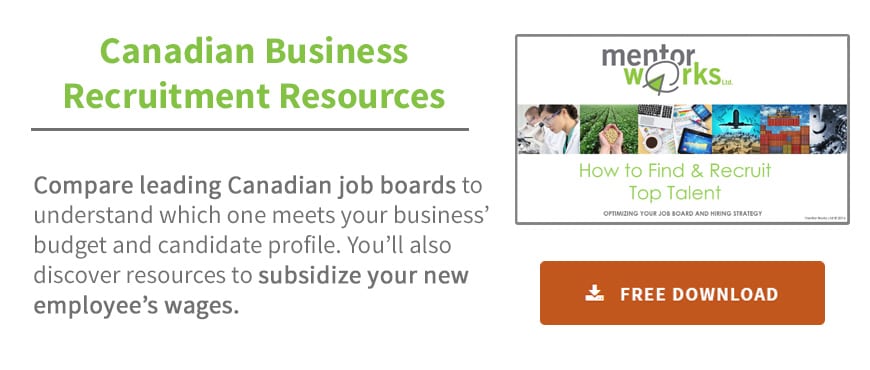How to Get the Most Value from Your Millennial Employees

Millennials have recently become the largest generation in Canada’s workforce. With Millennial representation growing from 17.8% in 2004 to 36.8% in 2014, chances are your organization employs several members of this demographic.
However, most organizations, unless led by a Millennial, are unaware of the ways to get the most out of their Millennial employees. This creates two significant problems:
- Employers will never receive maximum productivity or creativity out of their employee; and
- Employees become unsatisfied with the company or position and leave to find another business that is more aligned to a Milllennial’s aspirations.
As the number of employees in this generation increases over the next several years, companies of all sizes and across all industries must focus on improving their ability to attract and retain Millennial talent. Learning what Millennials want from their workplace, then being able to deliver on these key aspects is essential to keeping a highly efficient workforce.
Why is it Important to Support Millennials?
The importance of attracting and ultimately retaining Millennials is even more acute in light of widespread Millennial job dissatisfaction. Research published in The Deloitte Millennial Survey 2016 revealed that:
- 44% of Millennials indicated they would quit their job within the next two years; and
- 66% expected to leave their organization by 2020.
Thus, in order to increase Millennial representation within a company, employers must gain an understanding of who Millennials are and what they are looking for in a job.
How is the Millennial Generation Classified?
Although the exact parameters vary, the most widely accepted definition of a Millennial is an individual born between the early 1980s and early 2000s; therefore, according to this definition, anyone who is roughly between 15 and 35 is considered a Millennial.
Related Blog: 5 Tips for Successfully Recruiting and Retaining Millennial Workers
What Are Millennials Looking for in a Job?
Although I am a Millennial – born smack in the middle of this demographic – I cannot authoritatively speak on behalf of my entire generation. So, instead of making assumptions about what makes Millennials happily employed based on my personal opinions, I took the question of attracting/retaining Millennial talent to my peers and then amalgamated their responses below.
1. Access to Growth Opportunities
According to my survey, the most significant factor influencing Millennial recruitment and retention is access to growth opportunities. Millennial employees do not want to feel stagnant in their roles. These findings are compounded by the Deloitte Millennial Survey, which revealed:
“63% of Millennials believe their leadership skills are not being fully developed, but the ability to take on a leadership role is one of the most important drivers when evaluating job opportunities.”
Highlighting growth opportunities from the initial recruitment/interview stage will go a long way to attracting Millennials. Some important development opportunities most valued by Millennials include:
- Training courses to develop and refresh their skills;
- Potential for upward mobility; and
- Allocation of additional responsibility.
It’s also important to emphasize the opportunity to learn new skills and apply existing skills in different ways, which will attract Millennial job-seekers who are both looking to apply their degree as well as those looking to pivot their focus post-graduation. Moreover, providing access to growth opportunities at every stage of their career trajectory will help improve Millennial employee retention
Related Blog: How the Rise of Millennials Affects Entrepreneurship and the Economy
2. Feeling Like a Valuable Part of Your Organization
Feeling valued – specifically, feeling trusted and respected, as well as feeling like the work we contribute is valuable – is another significant factor influencing Millennial recruitment and, ultimately, retention. When discussing this post with a fellow Millennial, they asked me how (or if) I would include my age in my commentary, noting that I probably wanted to be taken seriously. Implicit in their question was the assumption my age would limit the value I contribute to this conversation, and that my opinion might be disregarded because I am currently 24 years old.
Undervaluing Millennials because of their age or relative inexperience represents a significant obstacle to employers wishing to create a diverse and highly productive workplace. My survey of my peers made it very clear that, in order to attract and retain Millennials, employees should be judged on merit and ability – not age or seniority.
All this isn’t to say Millennials need to be coddled, or that we expect to occupy high ranking positions; rather, Millennials want to work in companies where:
- we are given significant responsibilities;
- our work is recognized as valuable and is not overlooked;
- we can provide substantial input; and
- we aren’t treated differently (or as inferiors) simply because of our age.
Attracting Millennial employees involves demonstrating the importance of the role to your organization and emphasizing the opportunity to take on greater responsibility.
Other Important Factors Influencing the Millennial Job Hunt
A few other factors that were highlighted by several of my peers include:
- Flexibility, especially in terms of hours and the ability to work remotely;
- Team culture that is cohesive, close-knit, and collaborative, giving employees the chance to connect and solve problems as a group;
- Benefits such as incentive plans and health insurance;
- Ambitious management so employees feel like they are on an upward trajectory alongside a company that is actively pursuing its goals; and
- Company values that coincide with their own.
Canadian Government Grants to Hire and Retain Millennials
Regardless of your organization’s current ability to attract and retain Millennial employees, there are ways to strengthen your position and become more appealing to the demographic. In fact, there are even Canadian government grants to help your business hire and train Millennials. Managers should consider using the following small business grants to develop a workplace that is conducive to the happiness and success of Millennial employees.
Grants to Hire Recent Post-Secondary Graduates
Each year, federal and provincial funding programs are launched in support of businesses who hire recent post-secondary graduates. These college, university, and post-graduate candidates have gained the technical and theoretical knowledge necessary to succeed in the workforce, however a lack of practical experience is holding them back from being competitive with other candidates who have significant experience.
To reduce this experience gap and help employers provide quality work experience for Millennials, several government grants for hiring are available. These grants often reduce the cost of a post-secondary graduate’s wages by up to 50% to a maximum of $20,000 for work terms spanning from 4 months to 1 year. During this time, the Millennials will develop additional skills and learn your business so that they may become a long-term asset in your organization.
Small Business Grants to Train Your Millennials
Hiring Millennials is just one way that Canadian government grants can support your workforce’s growth. As stated throughout this blog, Millennials want to receive training so that they can improve and provide greater value to the company. Employers can satisfy this requirement by integrating consistent training programs throughout the Millennial’s professional development plan.
Although training can be expensive, using small business grants may help organizations minimize the cost. Some programs, such as the popular Canada Job Grant, can help employers reduce training fees by up to 66%. Provincial variants of the program, like the Canada-Ontario Job Grant (COJG) enable employers to recover a significant amount of their training investment. This funding encourages more frequent training sessions and accelerates the development of Millennial workers.
Recent Millennial and Youth Employment News:
- 50% Manufacturing Wage Subsidy Program: Career-Ready with CTMA 2022
- Virtual Career Fairs for Fall 2020: Find and Recruit Top Talent
- What to Apply for After CERB – All Canadian Income Support Options
- Government of Canada Invests $20.1M to Support Youth Entrepreneurs
- Career-Ready with CTMA Hiring Grants: Frequently Asked Questions

